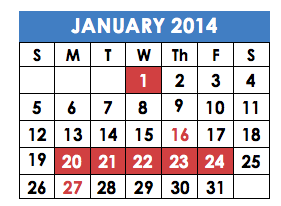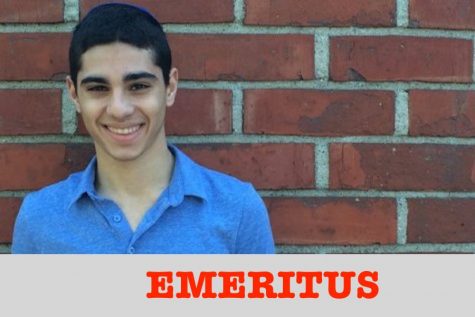No first-semester finals this year

MISSING: Finals week does not appear on the Shalhevet calendar for next January. The red days Jan. 20 – 24 are Winter Break, and Jan. 16 is Tu B’Shvat.
November 25, 2012
No, it isn’t April Fool’s Day or even the first day of Adar.
The administration has decided to cancel first semester finals this year, breaking with tradition in order to squeeze in more class time since school is starting later than usual.
And although second semester finals remain on the calendar for now, the school is seeing if this adjustment would also be beneficial down the road.
“I hate finals,” said General Studies Principal Mr. Roy Danovitch. “As a kind of model looking forward, we are going to evaluate if we need them. I think finals are basically a holdover from the ’70s and obsolete.”
The immediate reason, however, had to do with the calendar.
Because the Jewish holidays are early this year, the school avoided a stop-and-start beginning to the year by postponing the first day of classes until Sept. 9 – waiting until after both Labor Day and Rosh Hashanah, which this year are on different days in the same week (Sept. 1 and Sept. 3-5, to be exact).
In past years, class started the fourth week in August. With the number of days trimmed by two full weeks, finals were the odd man out. By removing them, the second and third weeks of January could be used to take up the slack.
“There was not a single person responsible for taking out finals week,” Mr. Danovitch said. “The administration as a whole looked at the school calendar, and recognized how finals could be taken away.”
Finals week, which occurs at the end of the semester, is a week when students are given three-hour tests in most of their classes. The exams are generally cumulative and worth more than an average test, making the week important to students’ semester grade and GPA.
To help students succeed, Shalhevet has always given students two days just to prepare before the exams begin. On the last day of classes, classes are shortened to 40 minutes so that students have a class with each teacher.
The second day, Review Day, is an optional day with teachers holding office hours to answer any last-minute questions. Additionally, each day of finals week ends at 2 p.m. instead of 4:20.
The administration looked at all the free time they gave students to prepare for the tests and saw that it could be seen as a waste of time, officials said.
School Principal Reb Noam Weismann, newly promoted from his previous position as Judaic Studies Director, said finals in general were a good method of “closure” for a semester, but that there was no need for some classes to have them.
“Unnecessary finals are unnecessary,” Reb Noam said. “You could argue that there are other ways to accomplish what finals accomplish.
“The main purpose of finals is to assess what the student has achieved, and there are other ways to do that.”
According to both Mr. Danovitch and Mr. Weismann, teachers asked some questions about the new plan but did not oppose it.
“They reacted well but with constructive questions,” Mr. Danovitch said, “natural questions about how they should give their final tests, how long they should be, and how we could end the semester in a healthy and productive way.”
As for the students, reaction varied. Junior David Ohana said he was relieved, yet he also saw the value and importance of finals.
“I like it objectively, hate it subjectively,” said David. “I despise finals, but I think they’re an important way of assessing knowledge and a good way to retain information.”
Sophomore Aviva Paskowitz was happy that a solution would allow for more class time, but worried it could affect the learning environment.
“It also means risking the students not taking class as seriously,” Aviva said, “because of not having to take a final on the things they learned that semester.”
Senior Paul Merritt, however, spoke for many in an opinion that was brief and to the point.
“This sounds great — no complaints,” Paul said. “I at least can’t find any backfires or anything wrong with it.”













